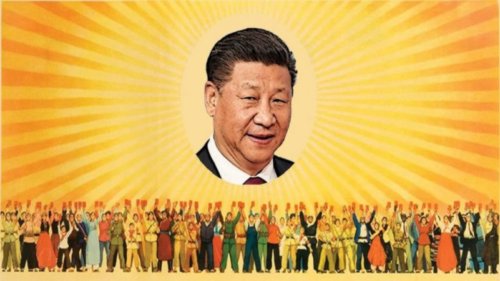Posts Tagged ‘CCP IS EXPANDING THEIR SURVEILLANCE’
China’s Imposes it’s First Lockdown of 2022.
On Feb. 7, the Chinese authorities announced its first lockdown in the Chinese year of the Tiger as a means of containing a COVID-19 outbreak. Residents of the famed Communist base Baise in Guangxi Province have been warned not to leave their homes as of Monday. The Baise city regime announced in a notice that the city was infected with the Omicron strain of the CCP virus. “Nobody can leave or enter our city. We can’t leave home.” On Feb. 7, Yun Fei, a resident of Baise’s Debao county, told the Chinese language Epoch Times that “all public transportation has stopped.” “The atmosphere is intense [in Nanning]. Some roads are blocked, and the intercity buses have stopped,” said a resident called Zhao from Nanning, the province’s capital, which is 165 miles away from Baise. “Some residential compounds have started to…
Read MoreChina’s Ambition to Harness the Fourth Industrial Revolution Incomparable to America.
Since at least the turn of the century, China’s People’s Liberation Army (PLA) has been experiencing a significant restructuring. For starters, it has spent years pursuing a mechanization and “informationization” “double construction” strategy. This “two-track” strategy called for near-term modernization of “existing equipment combined with the selective introduction of new generations of conventional weapons,” as well as a longer-term transformation of the PLA along the lines of the “revolution in military affairs” based on information technology (RMA). Officially, the PLA targets mechanization and “major progress” toward informationization by 2020, “complete military modernization” by 2035, and “world-class” military status by 2049. The PLA is currently focused on “informationization” in accordance with this timeline. Informationization refers to the application of information technologies to combined military operations on land, sea, air, space, cyberspace, and the electromagnetic spectrum. It also entails equipping the PLA with…
Read MoreChina Starts Initiative to Become Technologically Autonomous Despite Semiconductor Challenges.
Beijing’s quest for “scientific and technological independence,” particularly in the semiconductor sector, has gotten mixed reactions from around the world. While overseas companies fear the measure will stifle innovation and disrupt global trade, some China experts feel China’s chip development quality and success rate aren’t likely to produce meaningful results. In October 2021, T-Head, Alibaba’s semiconductor division, revealed the E-Ten 710, a new CPU chip. The chip, which is reported to be 5 nanometers in size, will be utilized only for Alibaba’s cloud computing business, with no intentions to sell it to third parties, according to Alibaba. Alibaba’s cross-border chip development is tied to the Chinese Communist Party’s “core making” objectives as an e-commerce powerhouse. China is the world’s largest chip consumer, accounting for around 36% of global consumption but just 15.9% of global output. Chip production is a primary objective…
Read MoreThe Chinese Communist Party is Expanding it’s International Surveillance Via Social Media.
As uncovered by hundreds of Chinese bidding documents, contracts, and company filings recently uncovered by a media outlet, China is now expanding its internal Internet-data surveillance network by using Western social media platforms like Facebook and Twitter to gather information on foreign targets. This information will let the Chinese Communist Party’s (CCP) government agencies, military, and police authorities better understand who they are targeting outside of China. According to a Washington Post story, China uses public opinion analysis technologies developed in the previous ten years as surveillance for its residents and as a trigger to alert officials about any politically sensitive things posted online. According to an analysis of bidding documents and contracts for over 300 Chinese government projects since 2020, the program was originally designed for China’s local Internet users and media, but it appears that the CCP is aiming…
Read MoreAnother Chinese Pro-Democracy Media Outlet Shuts Down Due to CCP Censorship.
On Jan. 3, a Hong Kong independent online newspaper announced its decision to close was prompted by the recent closure of Stand News, and that their journalists no longer felt secure under law enforcement’s ambiguous rules. Citizens News, a digital newsroom formed in 2017 by a group of senior journalists, announced its abrupt closure on Sunday, stating that it will cease updating its website at midnight on January 4 and shut thereafter. The online news organization, which had protected journalists from the now-defunct pro-democracy Apple Daily, claimed it could no longer function due to “rapid changes in society in the last two years and the deterioration of the media environment.” The decision, according to Stand News, was made to guarantee the safety of its employees. Chris Yeung, Citizen News’ lead writer, told reporters on Monday that the recent proceedings against…
Read MoreTwo Editors of Chinese Media Outlet Stand News Denied Bail for Conspiring to Publish “Seditious” content.
On Dec. 30, a Hong Kong court refused bail to two former top editors of Stand News who were accused of conspiring to publish “seditious” content. They were among seven people detained the day before in a police crackdown on their pro-democracy news organization, which garnered international outrage. The outlet’s former head editor, Chung Pui-kuen, was the lone defendant to appear at West Kowloon Magistrates’ Court on Thursday. Patrick Lam, who was interim editor-in-chief at Hong Kong’s Stand News until resigning after his detention on Wednesday, had his lawyer apply for bail while he was in the hospital. Best Pencil (Hong Kong) Limited, the company behind the now-defunct Stand News, was charged with the same offense. On Wednesday, the independent online news organization declared its closure, only hours after 200 national security agents stormed its office, froze its assets worth…
Read MoreChinese Communist Party Raids Media Outlet and Arrests 7, Including Singer Denise Ho.
On Dec. 29, more than 200 national security officers invaded the headquarters of a small online media organization and detained seven employees, causing various rights organizations to publish expressions of concern. After 500 police officers stormed local newspaper Apple Daily’s offices and detained five of its founders in June, Stand News, a non-profit founded in 2014, became the second Hong Kong media company to be searched in 2021. Both publications have a history of promoting pro-Hong Kong protester perspectives. The raid on Stand News’ office in the city’s Kwun Tong District finished at noon local time, with about 30 boxes of evidence and numerous laptops seized. Following the raid, Stand News declared on Facebook that it will cease operations immediately, as well as update all of its social media pages. It also said that all of its staff had been…
Read MoreThe Technological Surveillance that Led to Persecution in China.
Prior to the Chinese police hanging high-powered surveillance cameras and locking up ethnic minorities by the hundreds of thousands in China’s western region of Xinjiang, China’s hackers went to work building malware. The Chinese hacking campaign, which researchers at Lookout — the San Francisco mobile security firm — had started as early as 2013 and continues to this day, was part of a broad and incredibly illusive effort to pull in data from the devices that know their people best: their phones. Lookout found links between eight types of malicious software (some previously known, others not) that explain how groups connected to China’s government surveilled Android phones used by Xinjiang’s largely Muslim Uighur population on a scale far larger than had been realized before. The timeline suggests the hacking campaign was an early cornerstone in China’s Uighur surveillance efforts that would later extend to collecting blood samples, voice prints, facial…
Read MoreBagram Airport Could be strategically Beneficial to China.
Former President Donald Trump recently expressed concern that the Chinese regime could gain control of Bagram Air Base in Afghanistan, adding that his administration would have maintained control of the airbase upon a U.S. withdrawal from the country. Back in June, Chairman of the Joint Chiefs of Staff General Mark Milley told Congress that Bagram was neither tactically nor operationally necessary for the United States’ withdrawal from Afghanistan. The Biden administration pulled out all U.S. troops from Bagram in July, more than a month ahead of the widely-criticized chaotic pull-out from the country. The base, which was once the center of U.S. counterterrorism operations in the country, is about an hours’ drive from Kabul. Trump on Nov. 7 Fox News interview, said his administration would have maintained control of Bagram Air Base because of its strategic location. “We would have kept…
Read MoreCCP IS EXPANDING THEIR SURVEILLANCE OF HEALTH DATA TO MONITOR CITIZENS
AMERICANS SHOULD BE TERRIFIED THAT PRESIDENT-ELECT BIDEN WILL FOLLOW CCP BY IMPLEMENTING SOME SORT OF TRACKING PROGRAM TO MITIGATE THE SPREAD IN THE US… The COVID-19 plandemic has emboldened Beijing to expand its use of digital technologies in the name of public health and safety. From mass surveillance, tracking intelligence, and internet censorship to the use of social credit systems, augmented data-collection capabilities, and big data, China’s new normal exposes and expands encroachments on civil liberties. The plandemic has provided a ‘proof of concept’, but China’s actions in the new digital landscape extend beyond managing its own plandemic response and controlling its own citizens. China is aggressively pursuing global technological dominance by investing in its indigenous tech sector and exporting technological surveillance tools. The reach of Chinese-engineered and monitored social control systems has wide-ranging implications, with current plandemic conditions serving…
Read More






